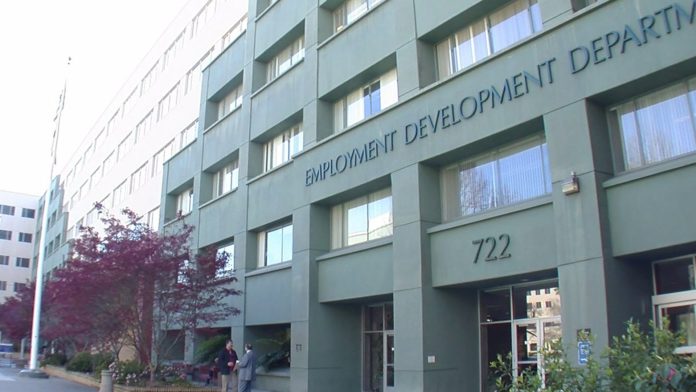
EDD. (Photo: EDD.ca.gov)
Does the EDD Owe the Feds Another $18 Billion Dollars?
Seems That Way…
By Thomas Buckley, September 2, 2023 7:25 am
Buried in a state Controller’s Office financial report, there is a rather odd entry: a $17.9 billion dollar “current liability” owed to “other governments.”
The Controller’s Office said the $17.9 billion line item refers to “amounts due to the Federal Government, primarily associated with federal grant expenditures for which the State was not able to verify eligibility of claimants under federal program guidelines.”
This does not refer to the $18.5 billion dollars the Employment Development Department owes the federal government for its fraud-filled disastrous pandemic unemployment benefit system response.
It’s in addition to that figure, meaning the total unemployment-related federal debt could be more than $36 billion dollars.
While neither the Controller’s Office nor the EDD would explicitly confirm it, the debt is almost certainly related to the state not being able to prove that that $17.9 billion dollars was sent to actual eligible unemployment claimants.
The language used by the Controller specifically parallels federal unemployment benefit program reporting guidelines.
Whether or not that is part of the $32-to-$40-billion-dollar overall fraud loss the EDD was fleeced for during the pandemic is not clear.
Either way, again – the unemployment-related debt to the feds appears to actually be more than $36 billion dollars (it is theoretically possible the debt is related to another program but that doesn’t remove the debt itself.)
It is unknown if that debt can be added to the existing unemployment trust fund debt or has to be treated – and paid back – separately. If it can be lumped together, that could extend out the surcharge every business is already paying per employee. The rate increases each year – this year it’s $21 and it will increase by $21 per year (plus additional increases starting in a few years) until it hits $420 per year per employee, which the surcharge is already expected to do. Originally, the EDD had estimated it would take only seven years to pay the debt; if the other debt is added it could be more than 25.
The “trust fund” part of the debt is growing because the EDD cannot cover its day-to-day bills now and is borrowing another $18 million a day, or $214 a second, or $25 bucks literally in the blink of an eye. Whether or not the “eligibility” debt is growing is unknown.
The EDD did not respond to multiple requests for comment/explanation; the Controller’s Office did provide requested information but did not directly comment further.
Indirectly, though, the Controller’s Office – like the Legislative Analyst’s Office and the State Auditor blasted the EDD’s gross incompetence. In the report – the Annual Comprehensive Financial Report for fiscal year ending June, 2021 (the latest available) – the office stated it was unable to perform a proper audit of the EDD because it has “inadequate internal control over its financial reporting for unemployment benefits.”
A typical government agency audit results in an “unmodified” or “qualified” opinion – unmodified means everything seems fine, qualified means there appears to be errors. The Controller’s Office could not even give the EDD an opinion at all, issuing what it called a “disclaimer,” due in part to the EDD being “unable to provide complete and accurate accounting information supporting revenues and benefit payments.”
In other words, the EDD is so bad they can’t even figure out how bad it is.
- Benefit Fraud Problems and Solutions - November 7, 2024
- A Little Exit Poll - November 5, 2024
- Tomorrow’s Headlines Today! - November 5, 2024




The burden of this repayment will fall most heavily on small businesses in California. Each company is charged a portion of the liability at year end (surprise!). Unemployment taxes are based upon the first $7,000 of each employee’s wages. This is a discouragement for hiring.
A more balanced approach would be for this liability to be picked up based upon gross receipts of businesses.
My guess is the commie feds won’t make the commie California EDD pay squat.